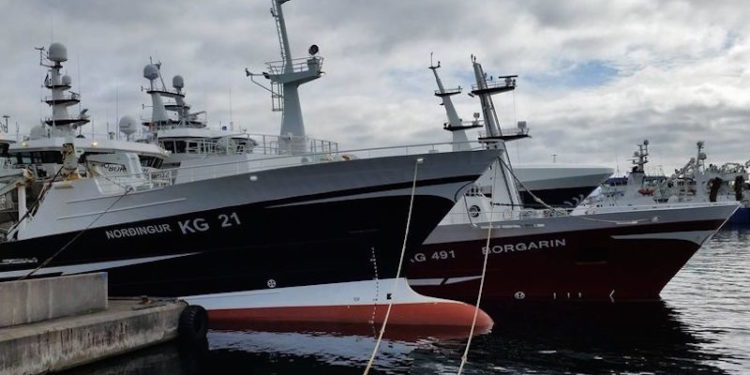The Faroese fleet yesterday sailed en masse to dock in Tórshavn where fishermen came together to protest against the government’s plans to drop the longstanding days-at-sea system for most of the fleet, to replace it with quotas.
Faroese fishing vessels, including several heavily laden with blue whiting after coming direct from fishing grounds, filled the harbour in Tórshavn yesterday and fishermen from all parts of the islands filled the streets just as the Faroese Parliament was due to debate changes to the fisheries management regime.
The fleet all sounded its foghorns for ten minutes yesterday morning to ensure that nobody in Tórshavn could be unaware of their presence and the fishing industry’s strong feelings on this.
A key aspect of the government’s plan is for a percentage of certain quotas to be auctioned off to the highest bidder, which could include foreign owners licensed to register tonnage under the Faroese flag to catch those quotas. The proceeds would go to the state.
The Faroese fishing industry as a whole, both fishermen’s unions and vessel owners’s federations, as well as the banks that see hefty risks, have been firmly opposed to the government’s plans which threaten to overturn a management regime that is seen as having some flaws, but is one that there is agreement works largely to everyone’s satisfaction.
The Faroe Islands experimented with an ITQ system in the early 1990s, but this was abandoned as unworkable within a year and replaced with the days-at-sea system in home waters that applies to the demersal fleet. Pelagic fisheries and quotas in waters outside the Faroese EEZ, such as in the Barents Sea, are subject to quotas.
Now it remains to be seem how effective the fishing industry’s opposition to the changes in legislation is going to be, with the industry implacably opposed to the implementation of a regime that fishermen see as a threat to their livelihoods, while the government sees the possibility of an revenue stream from the quota auctions.









